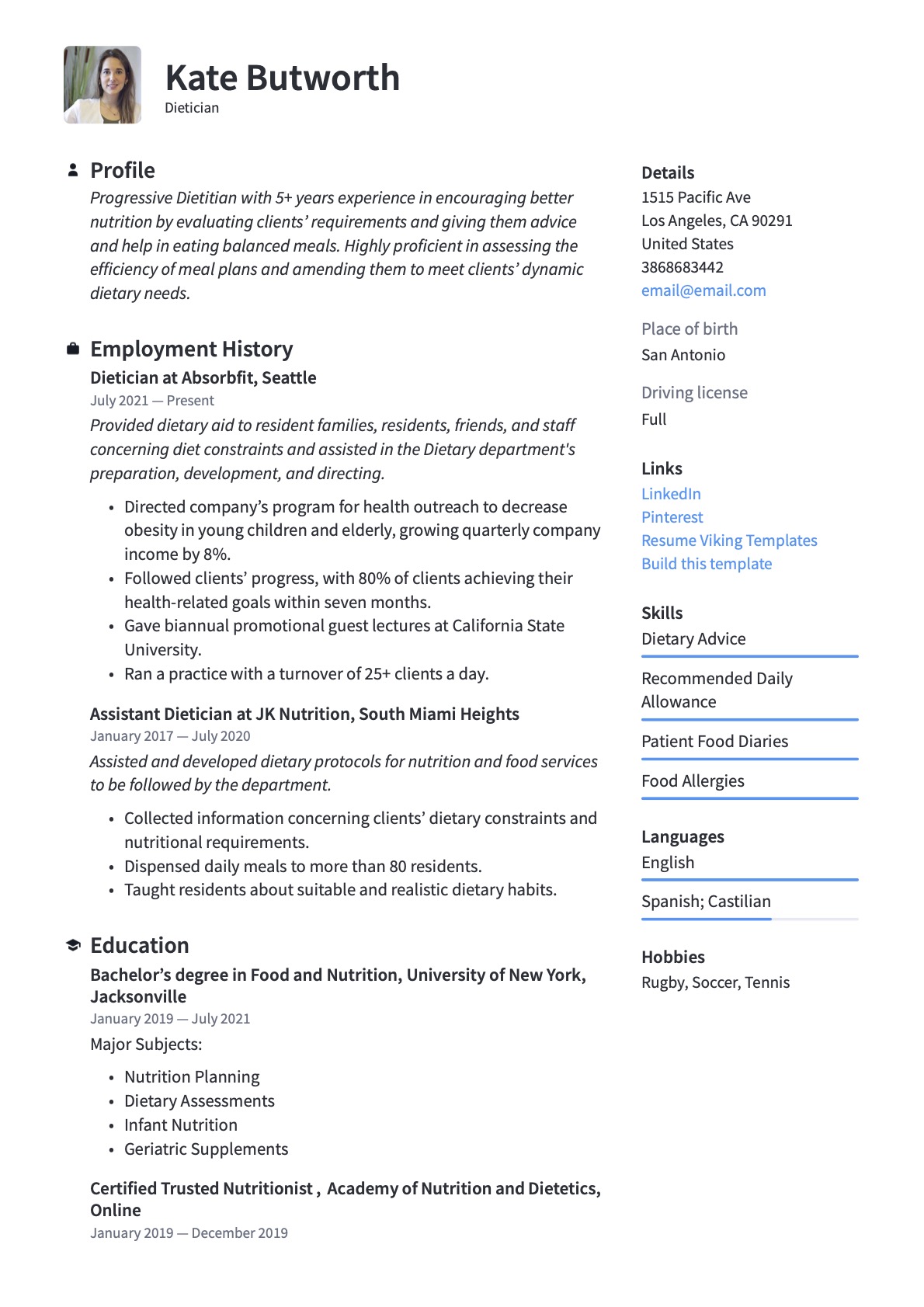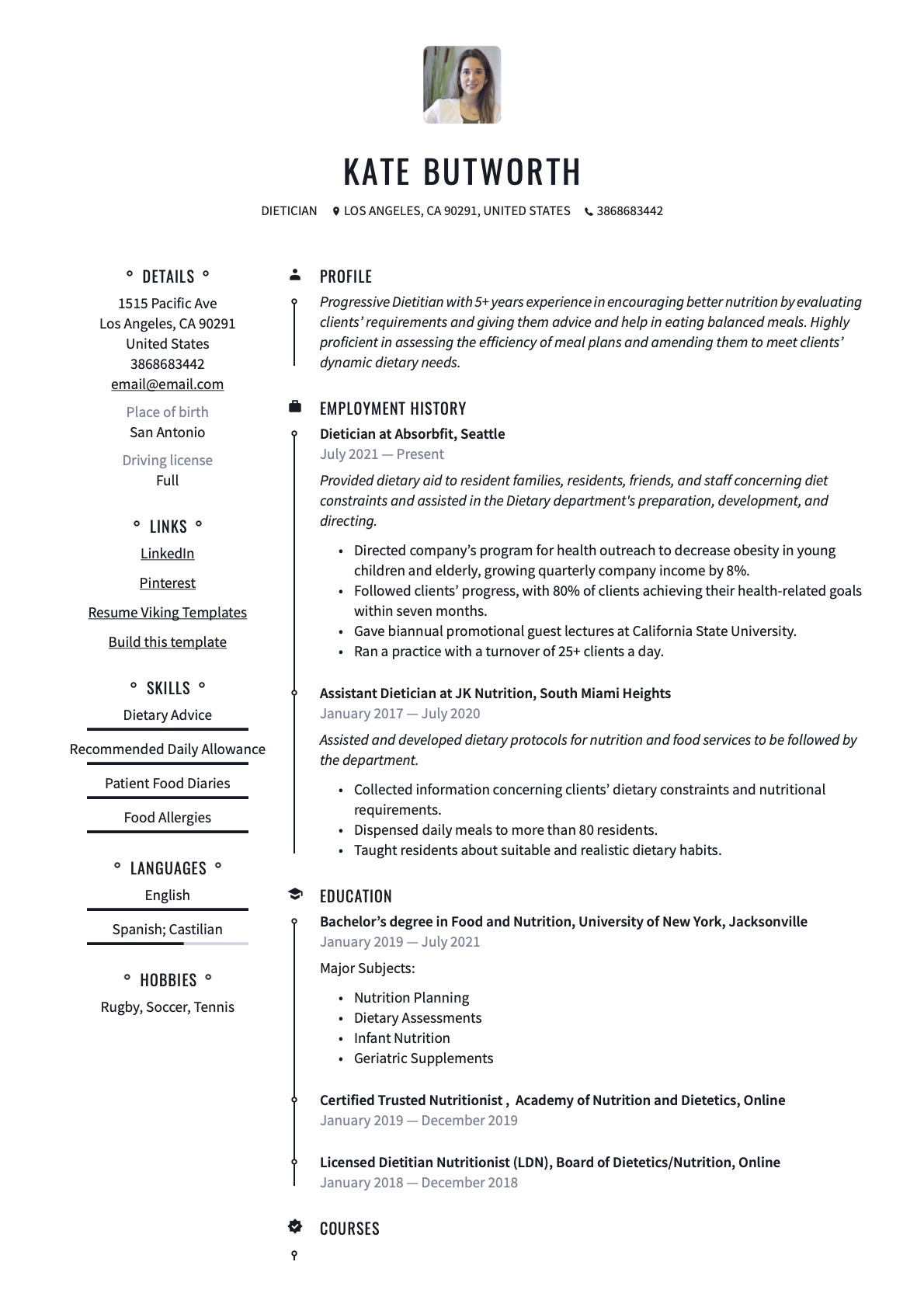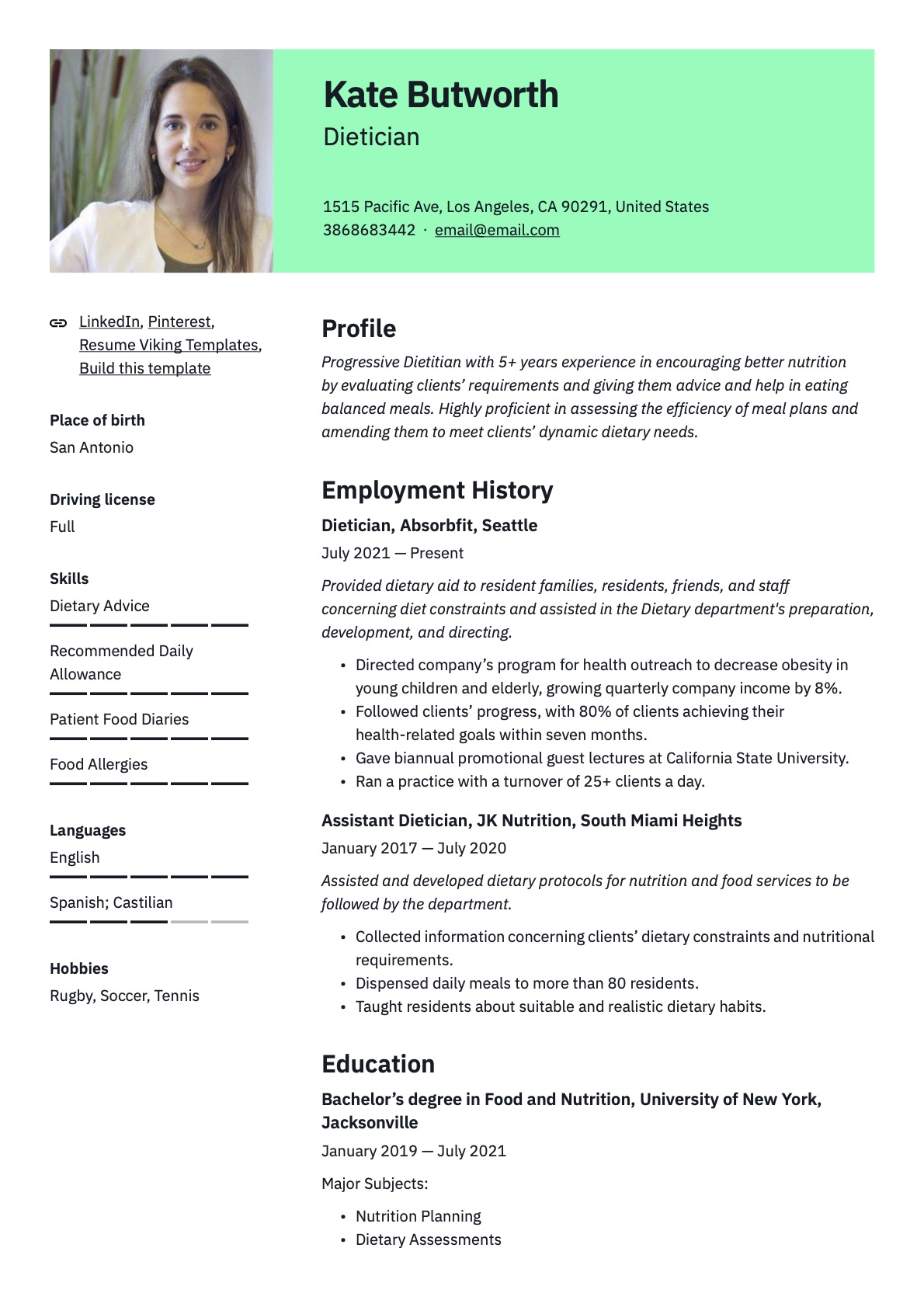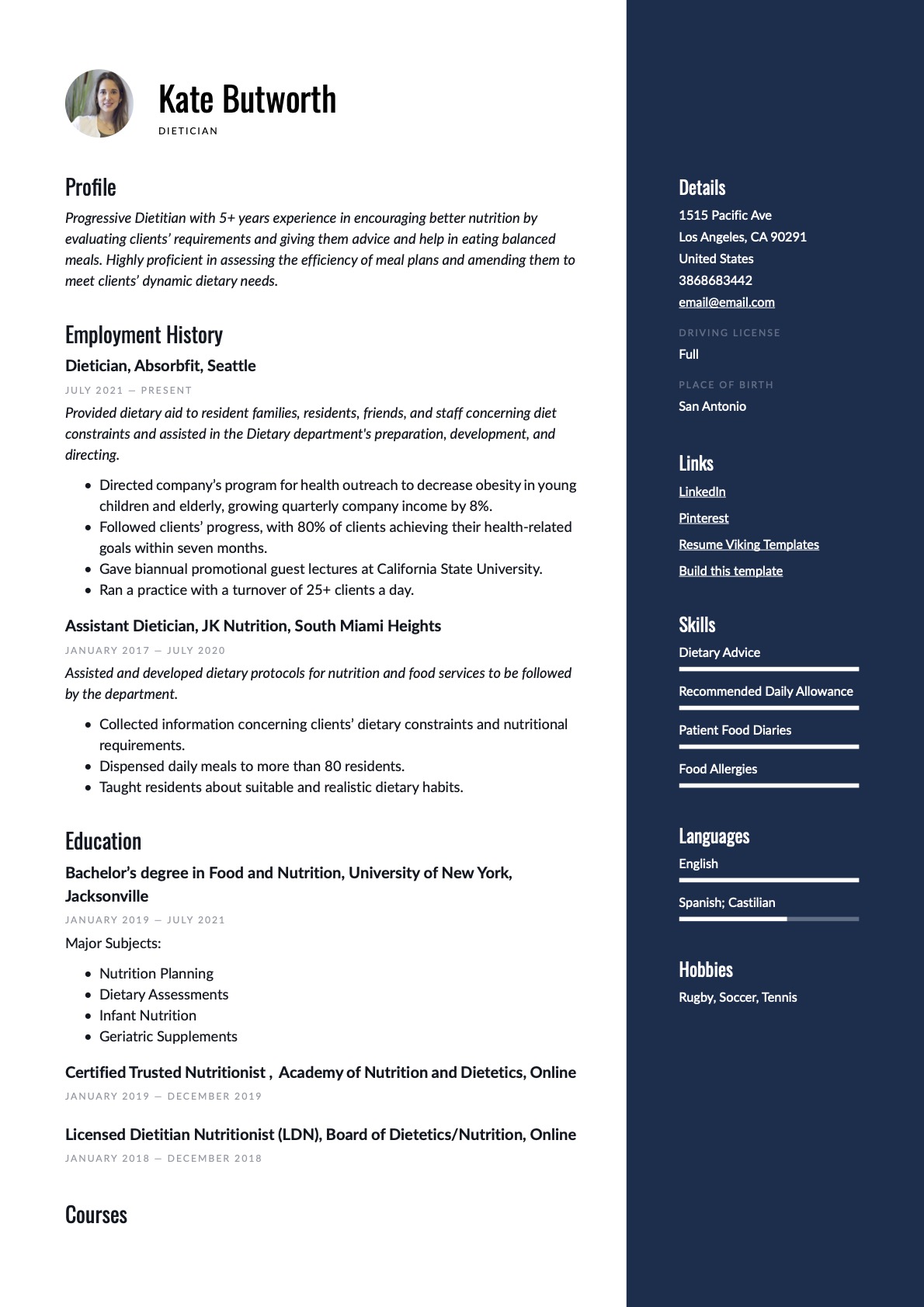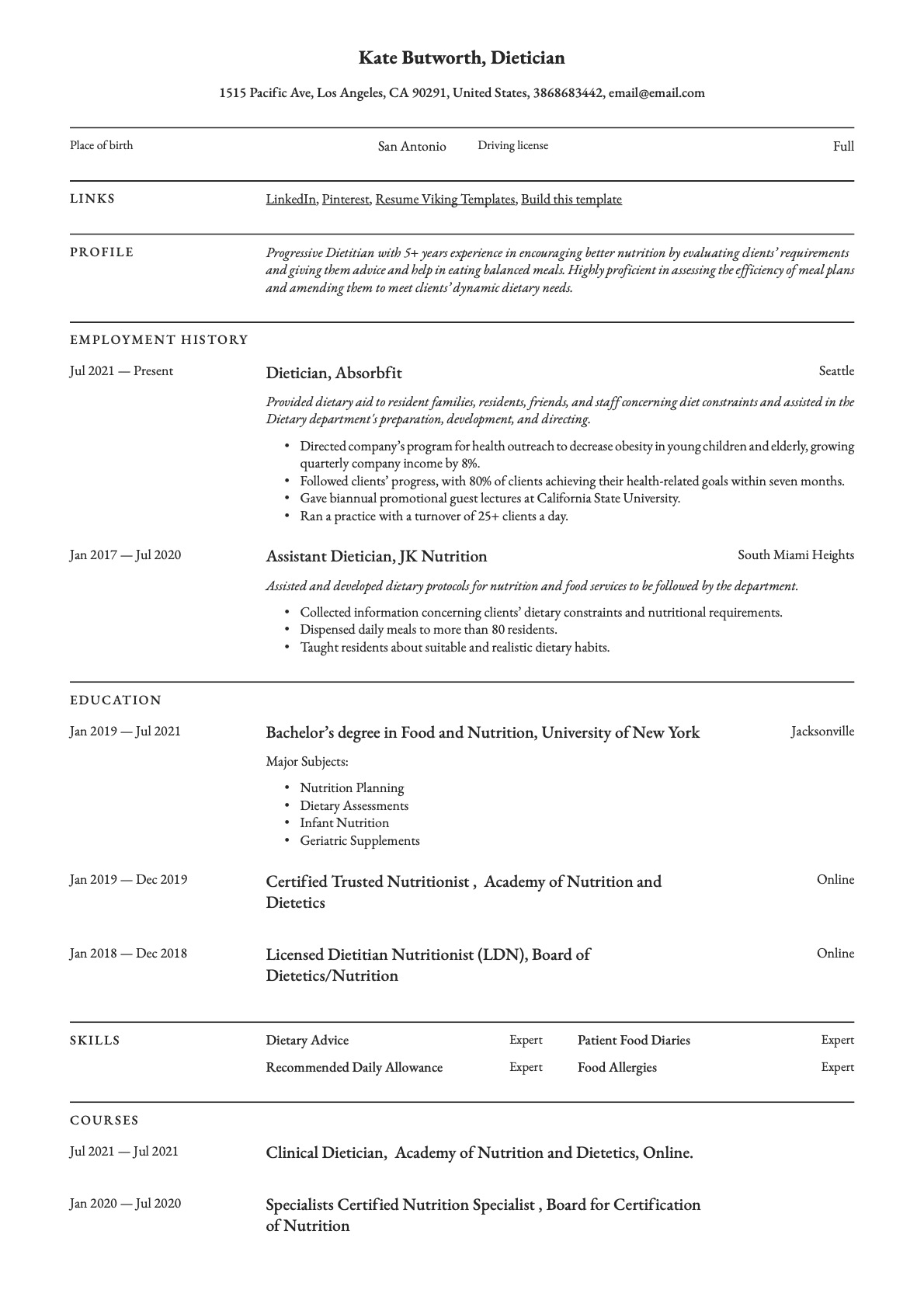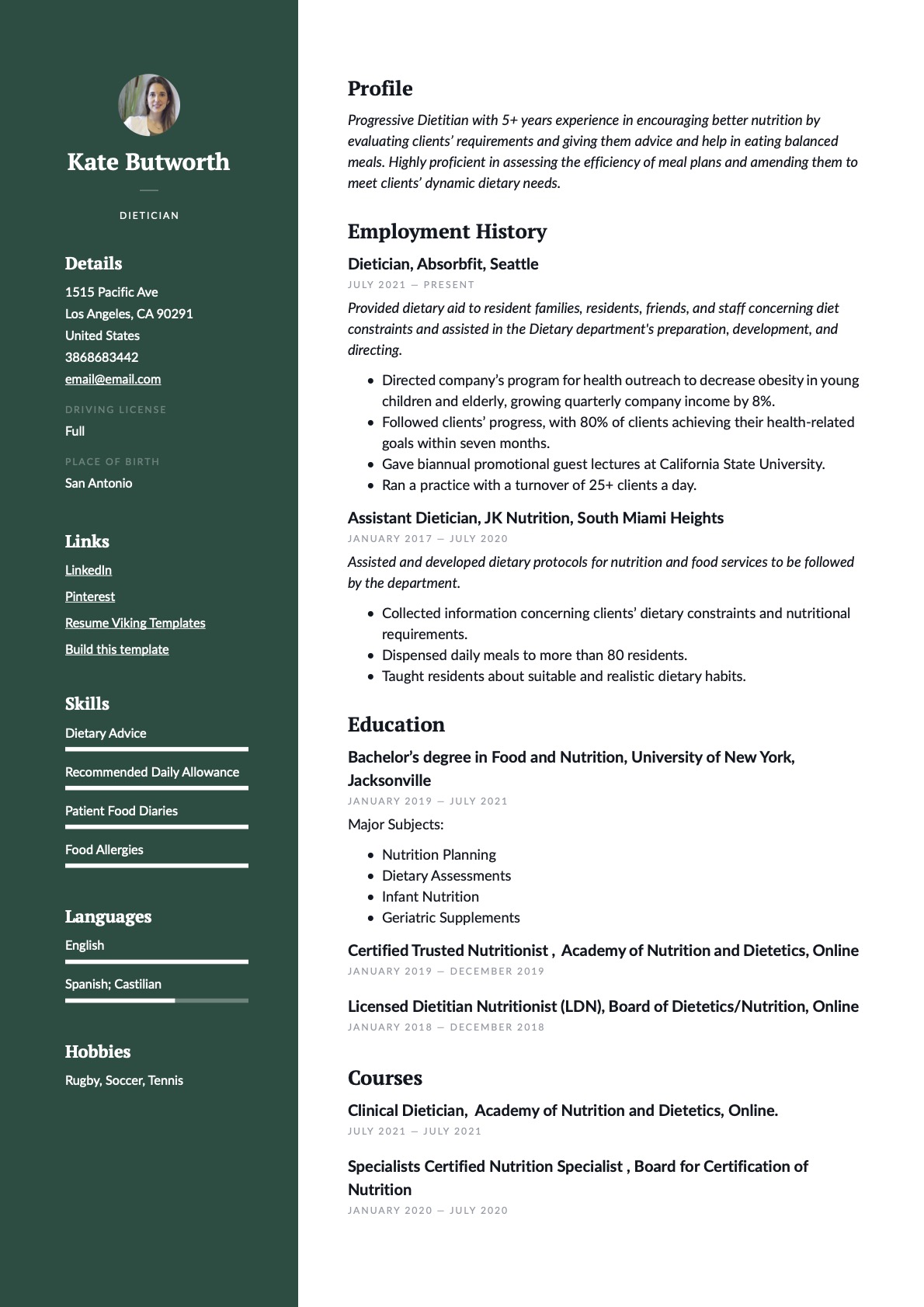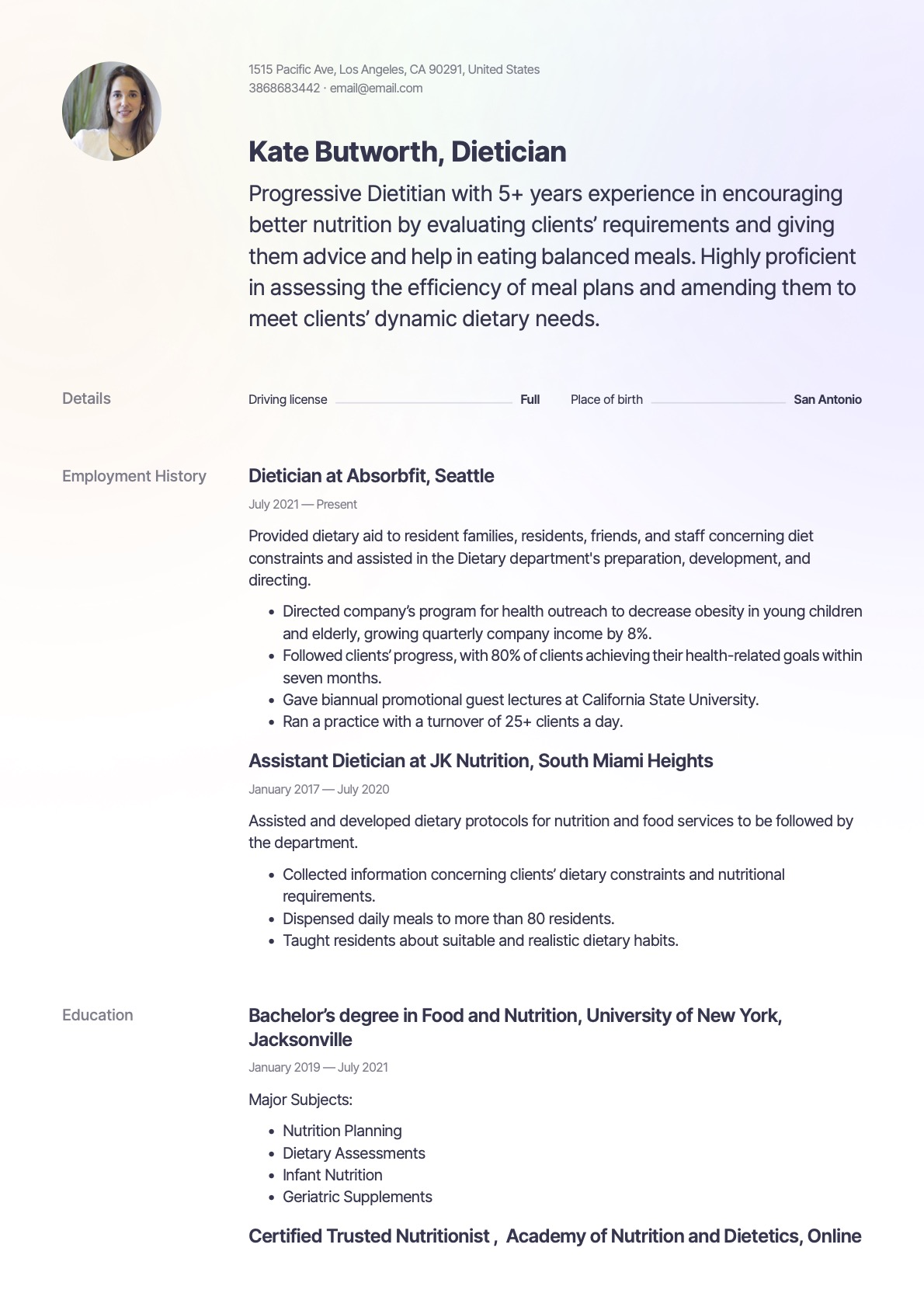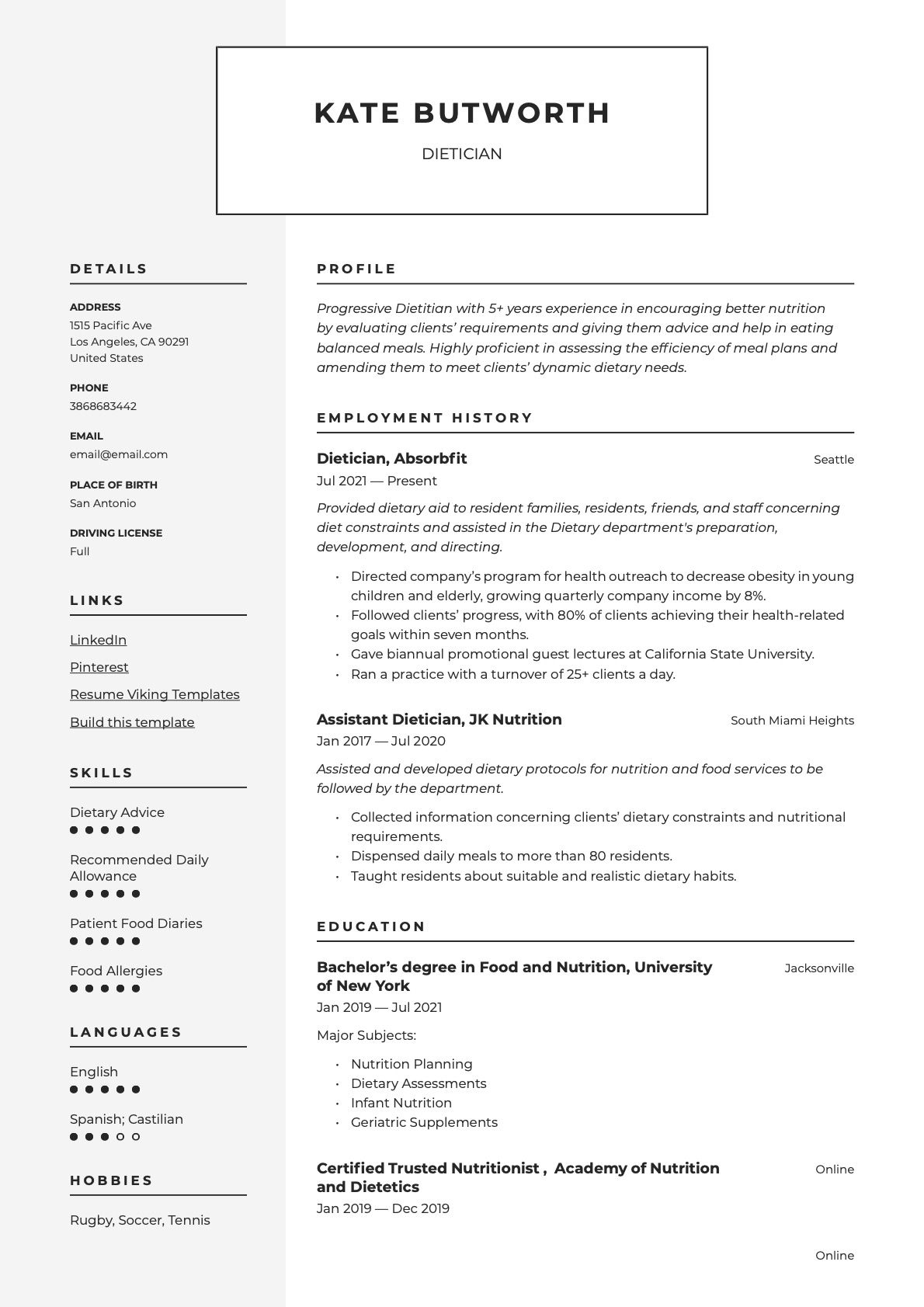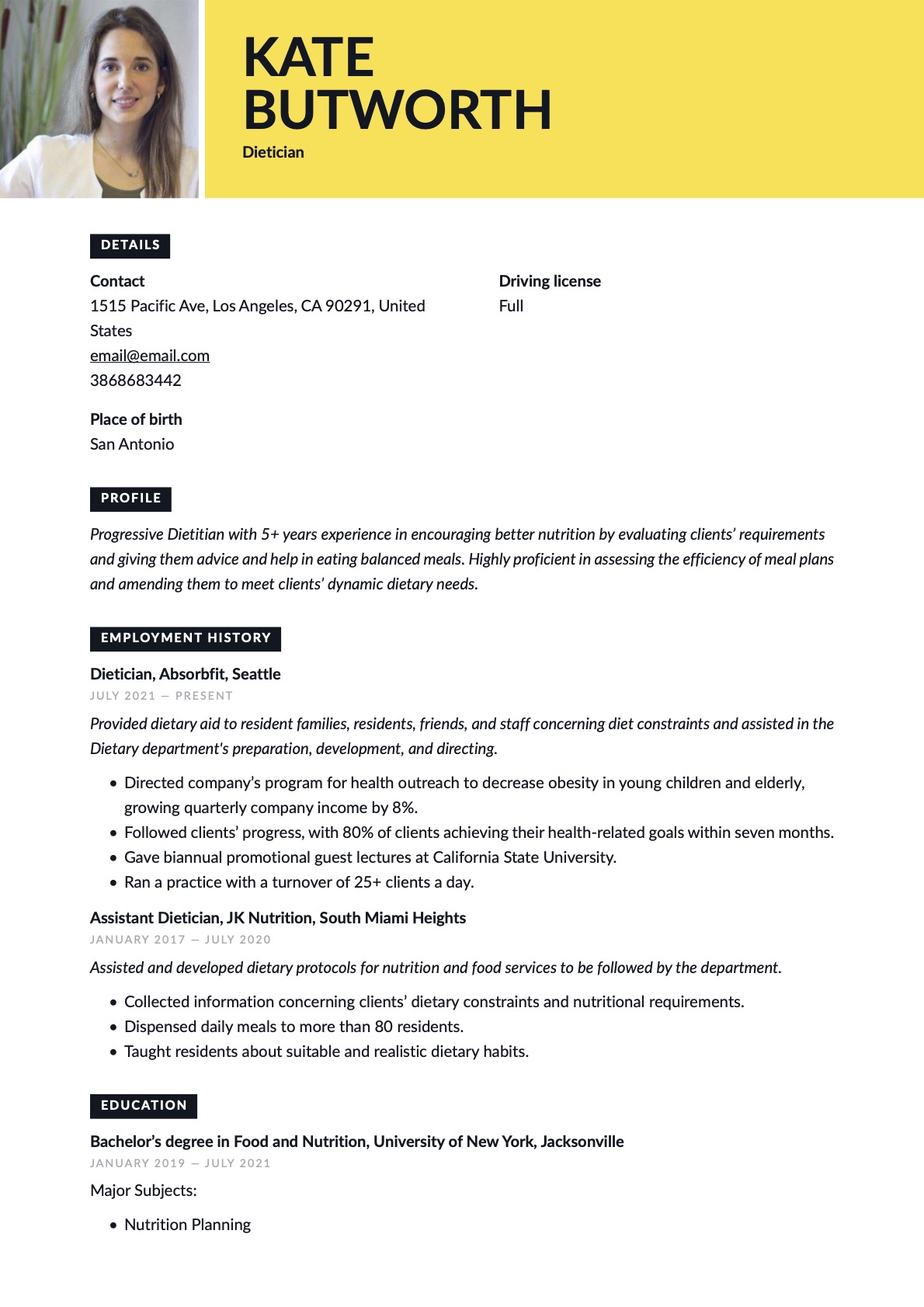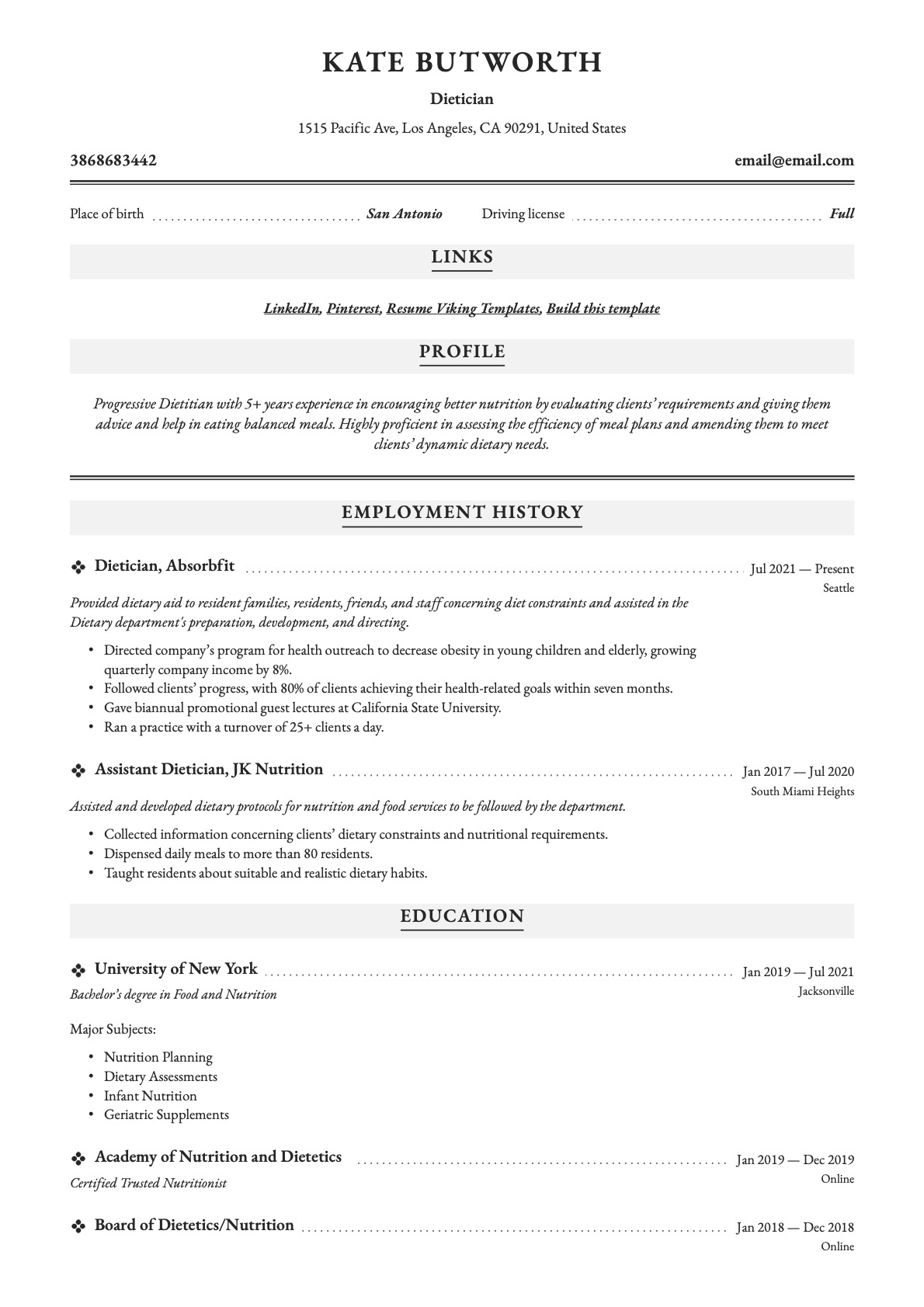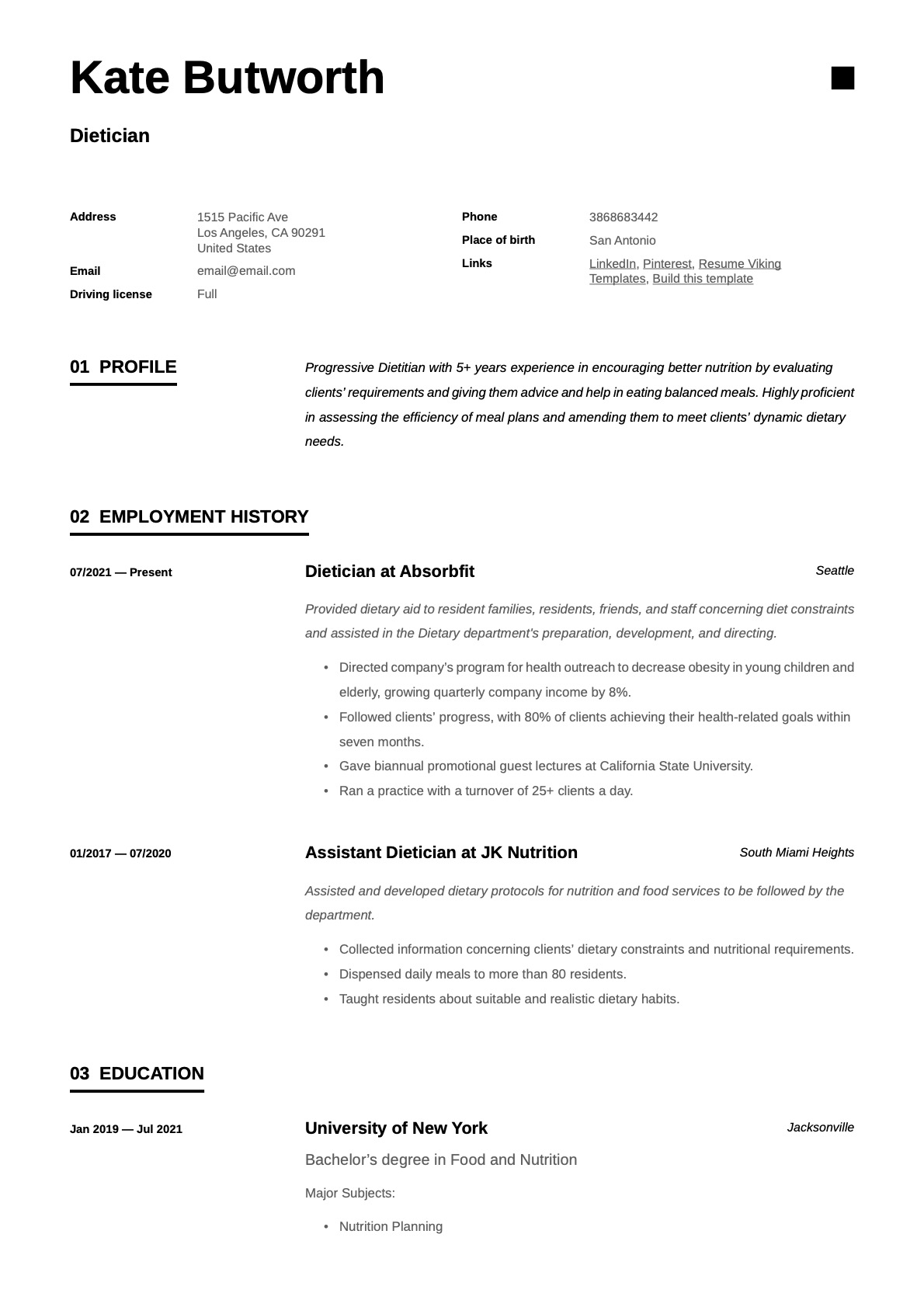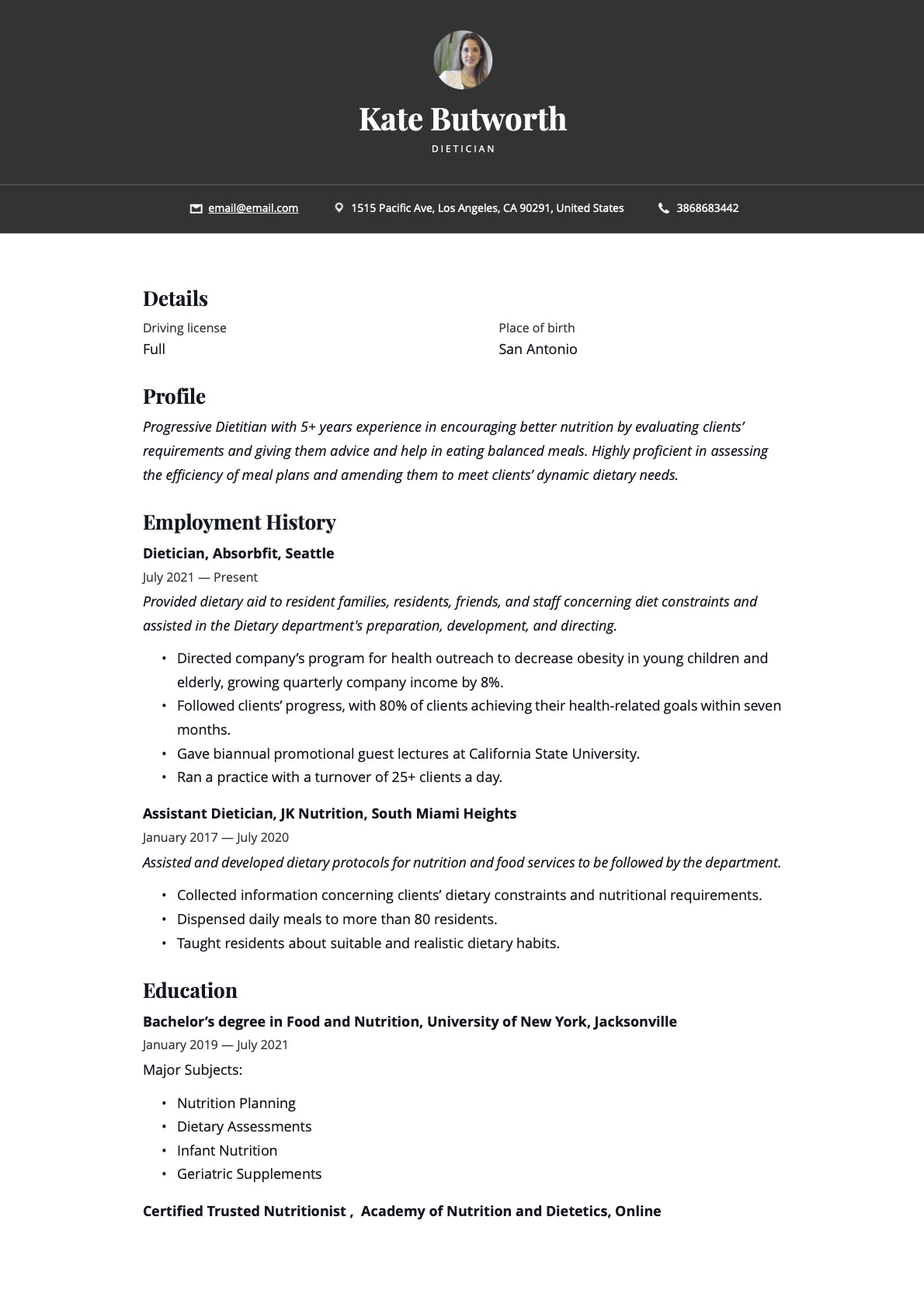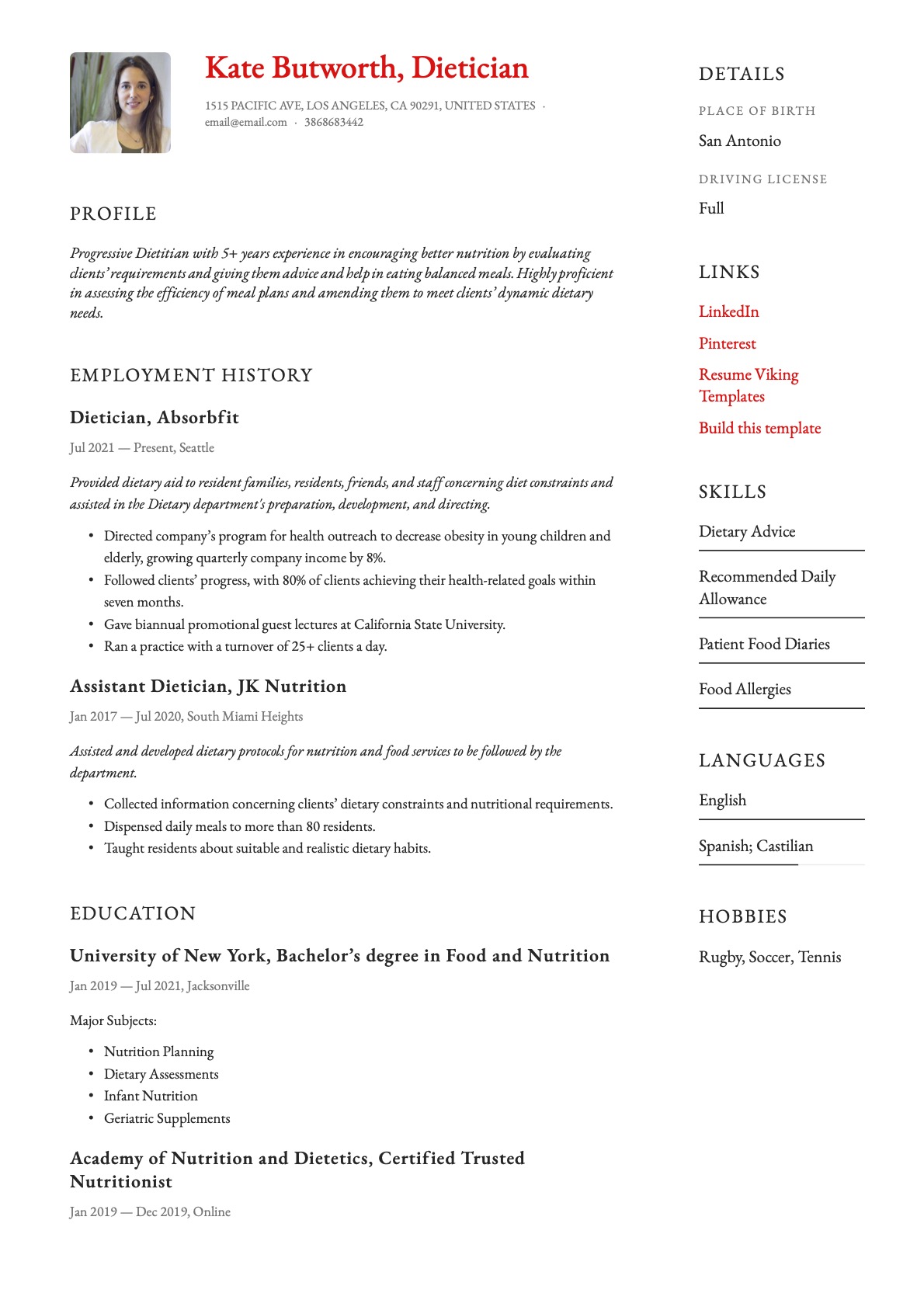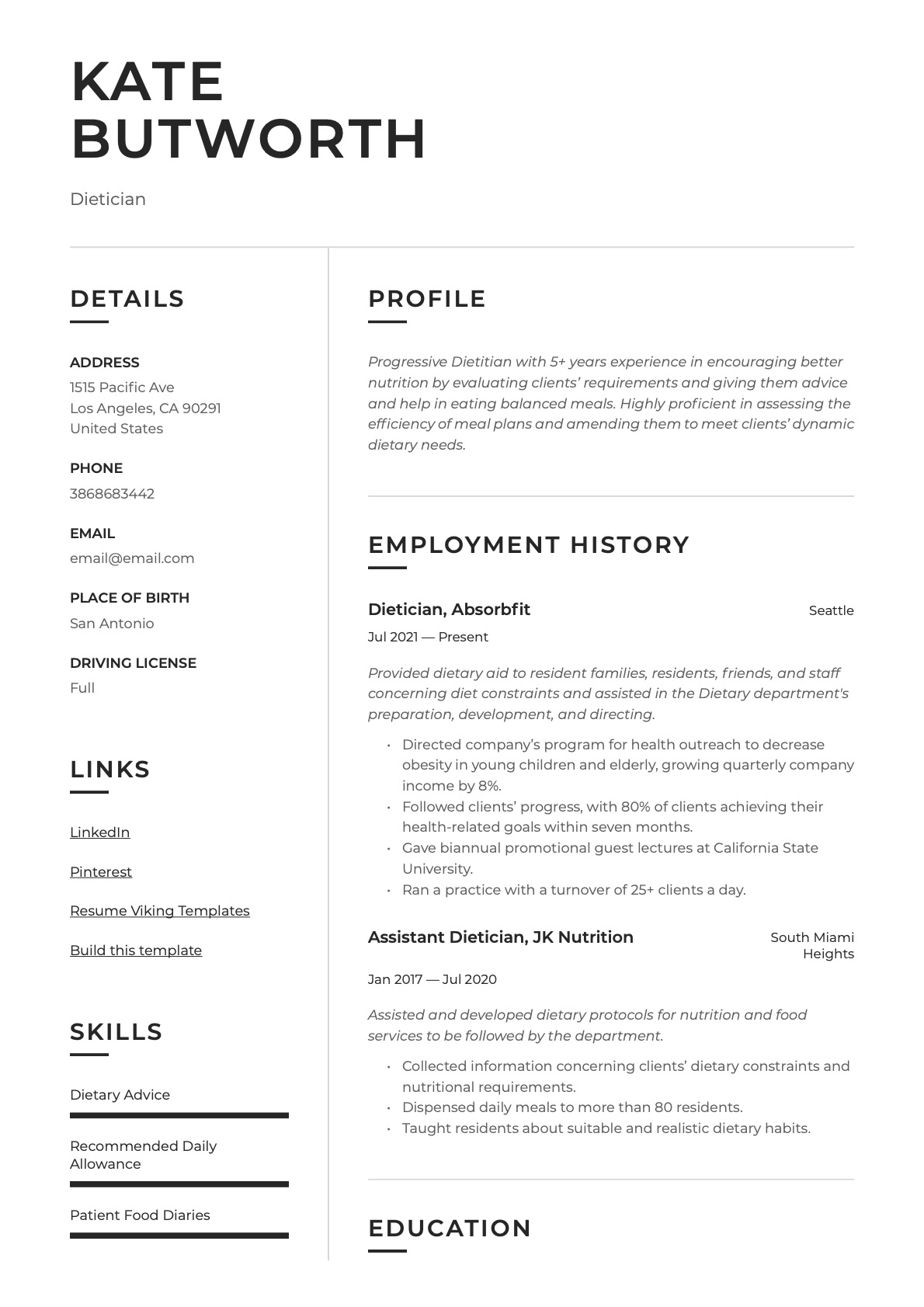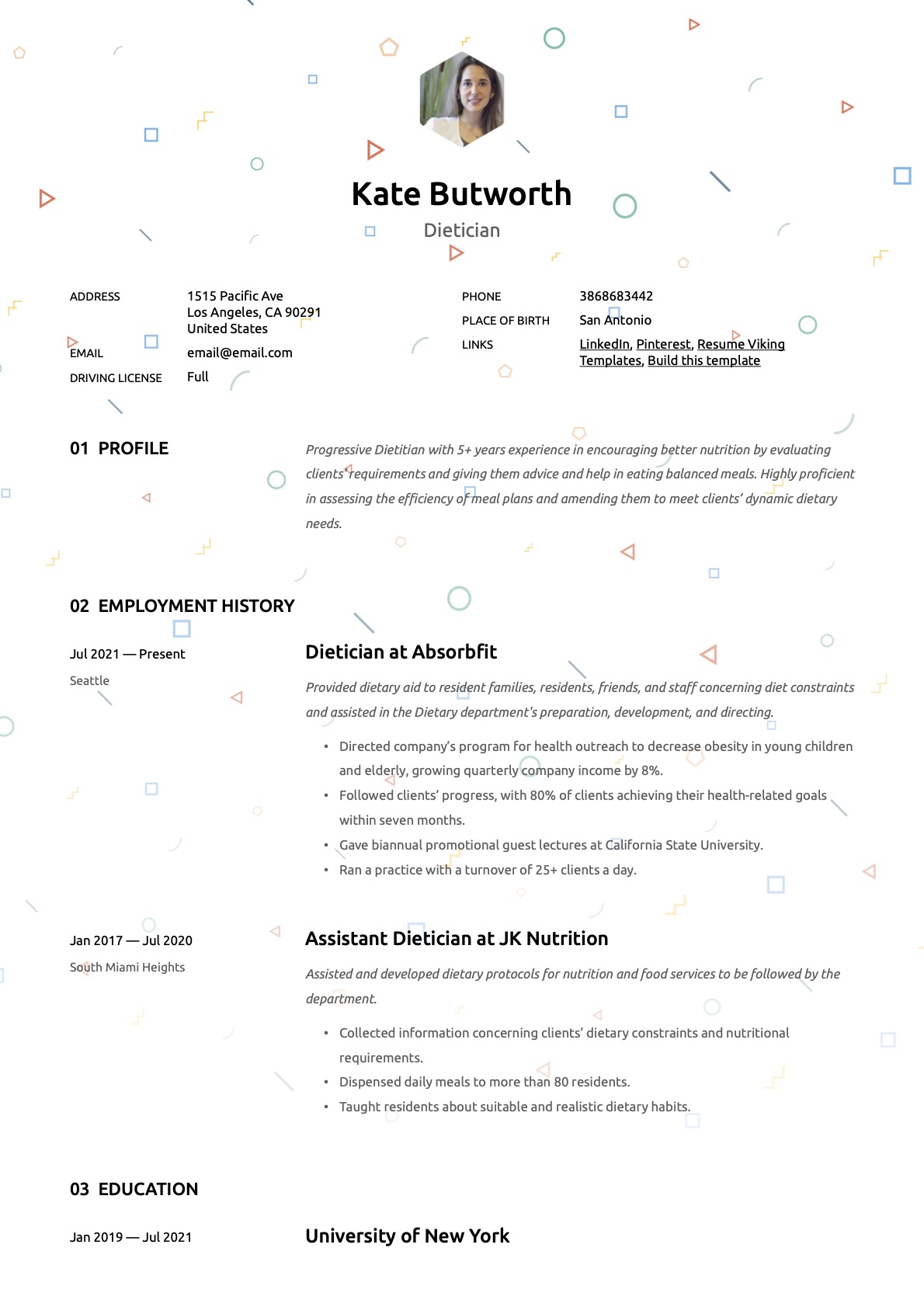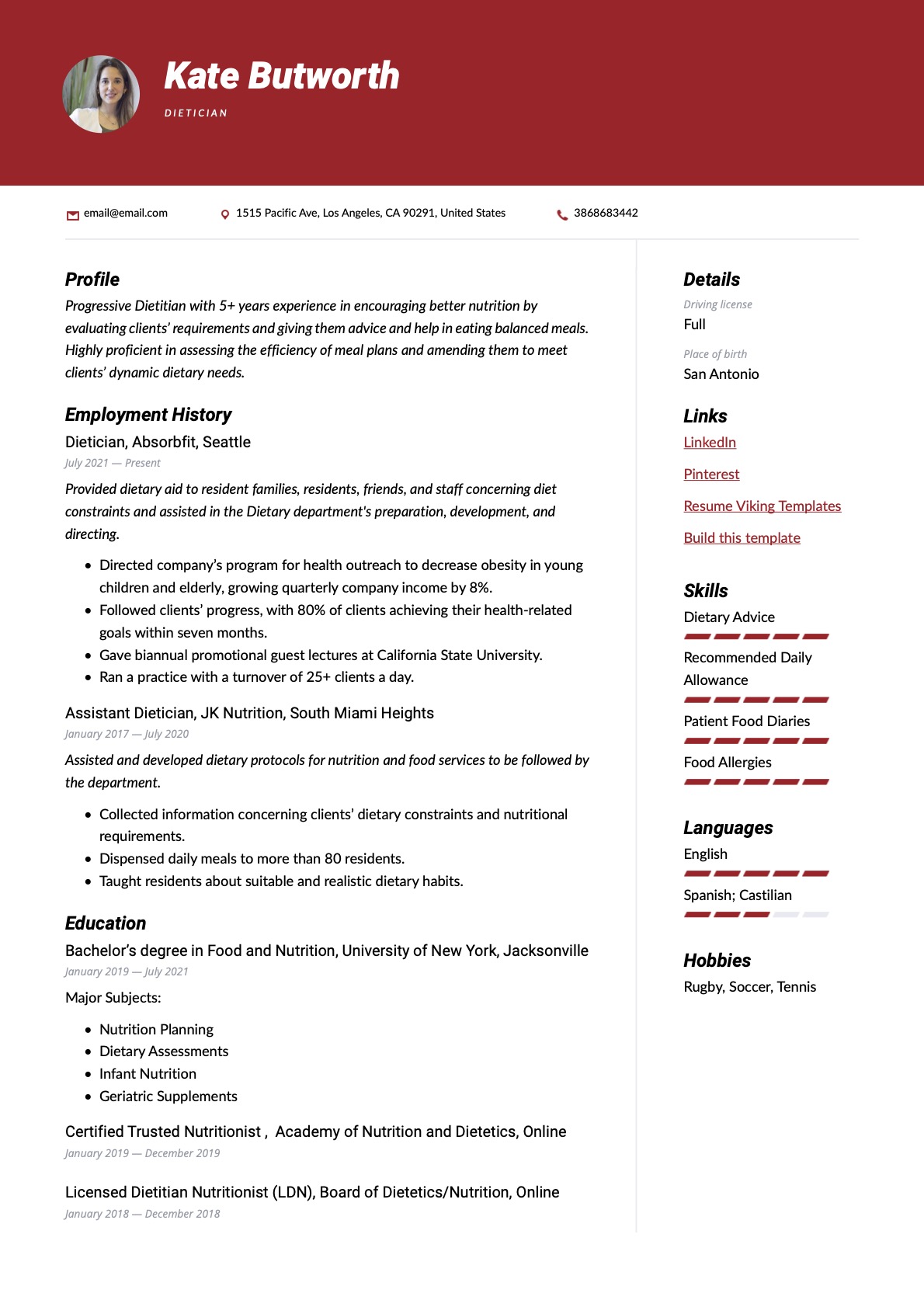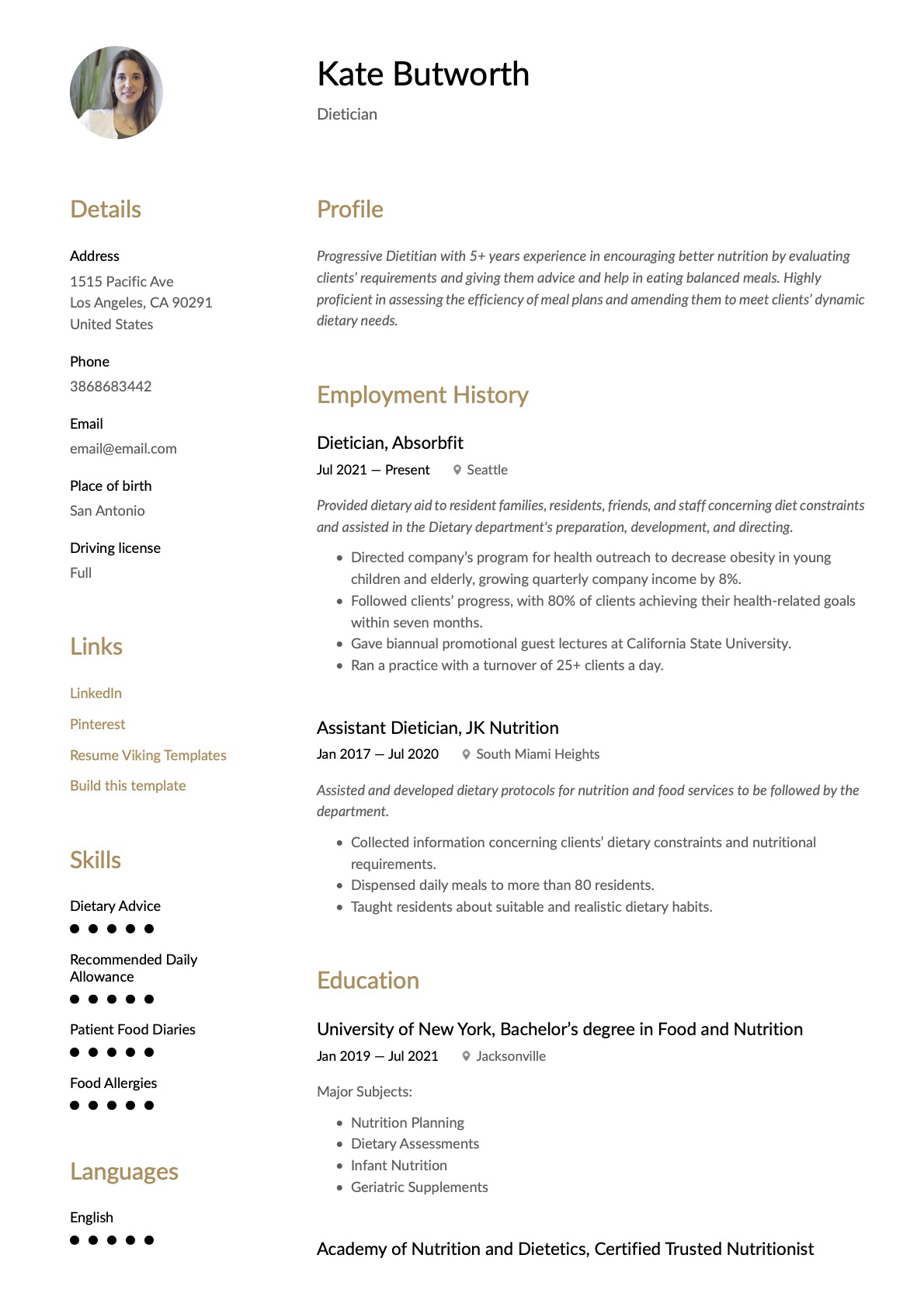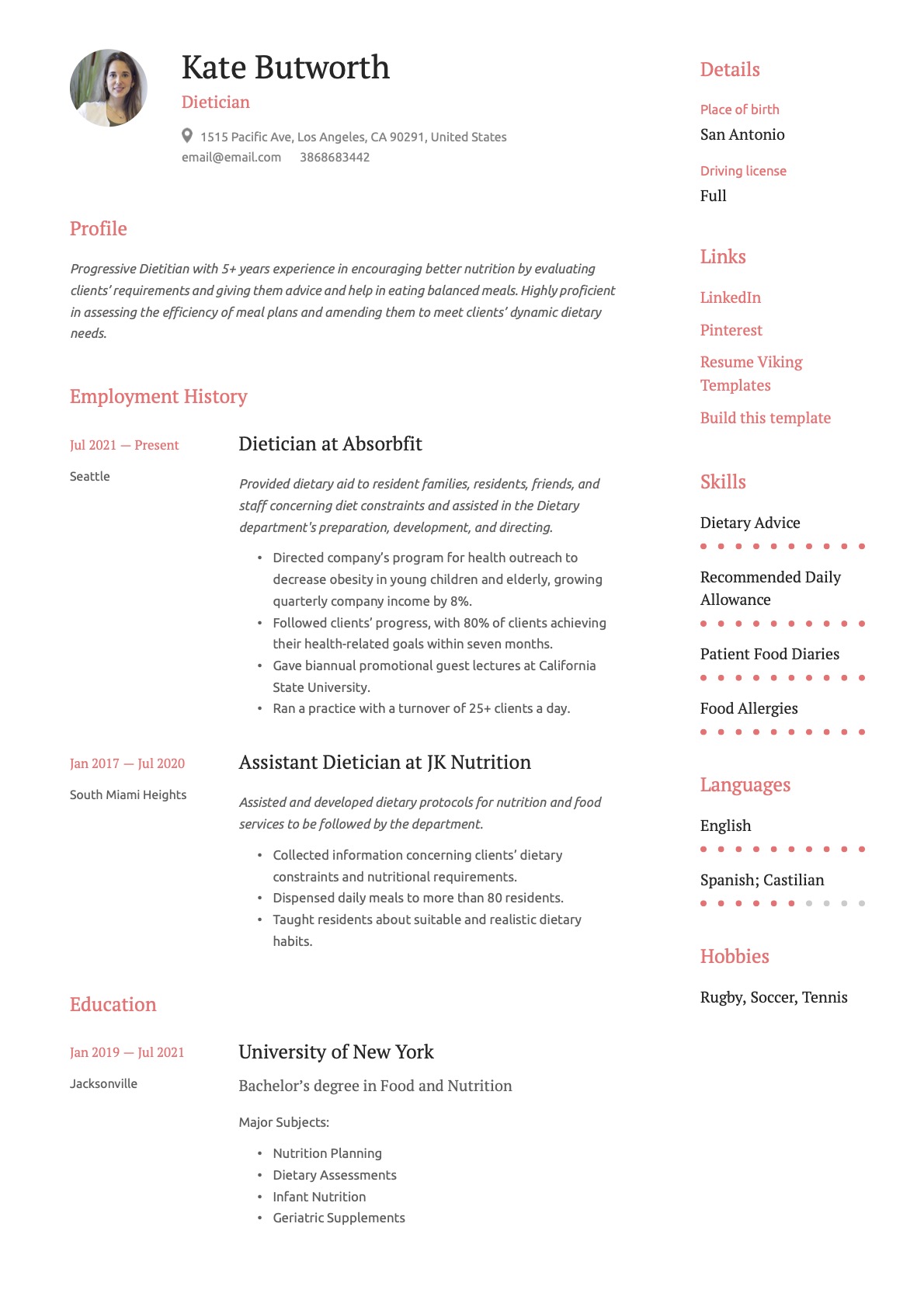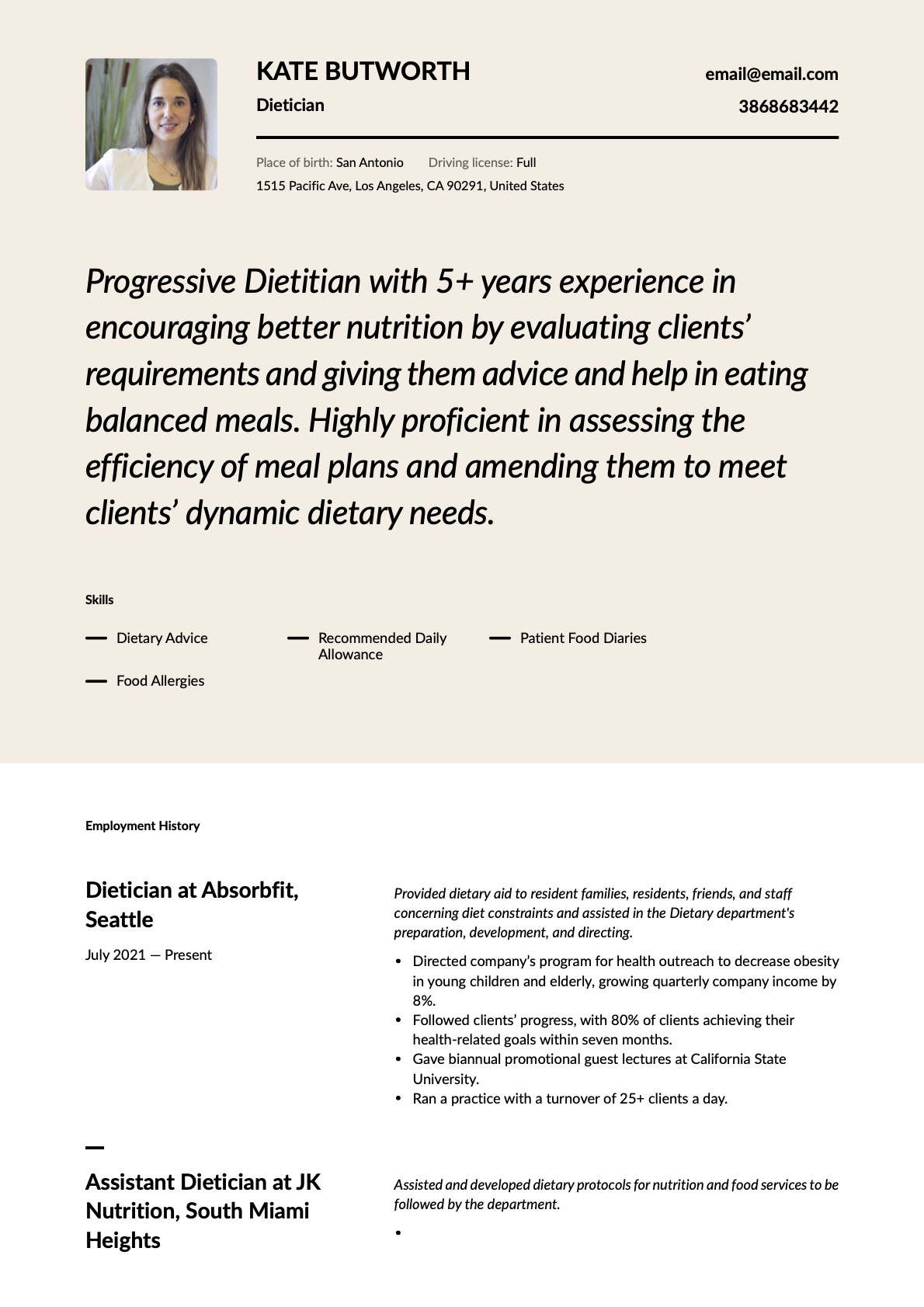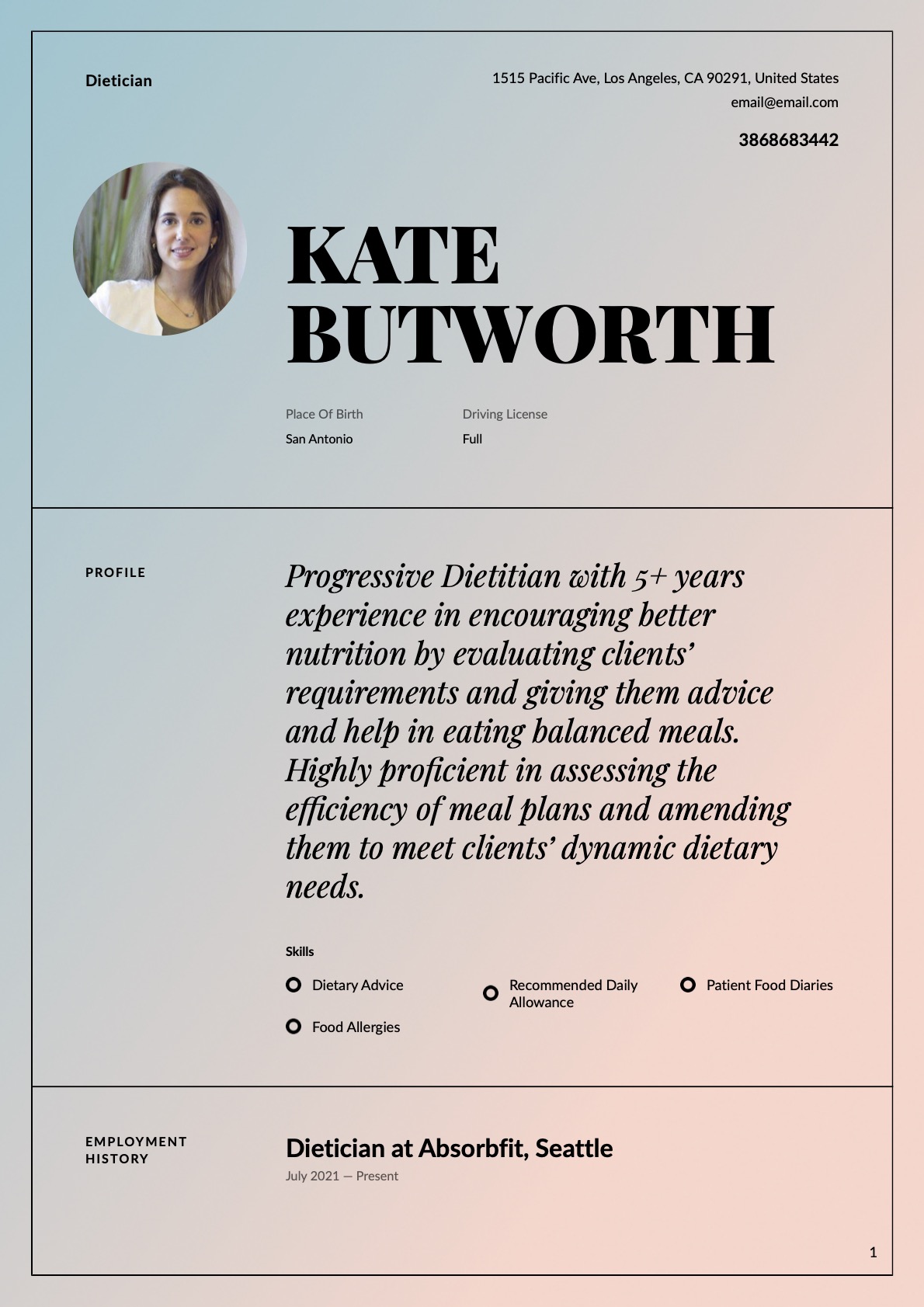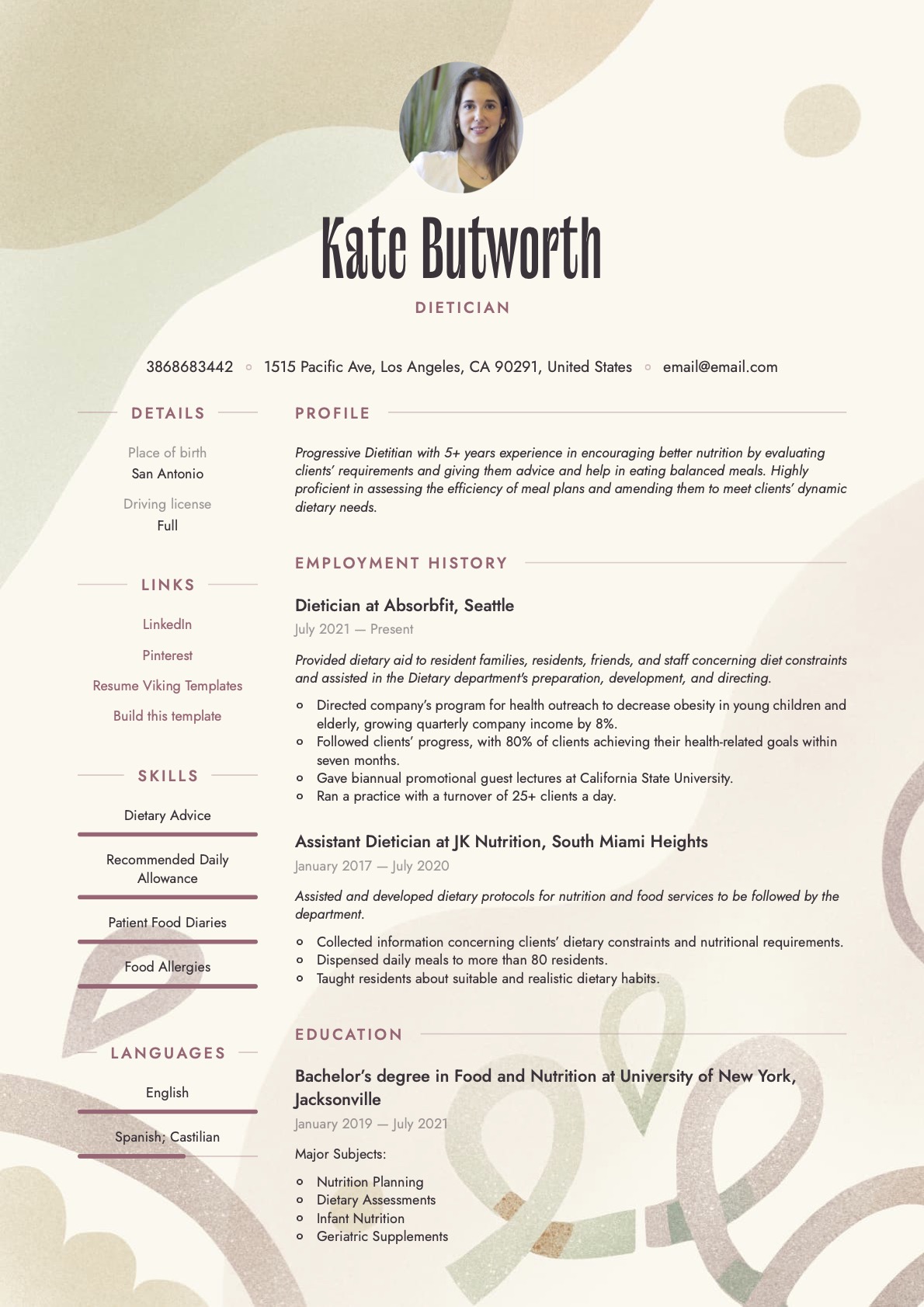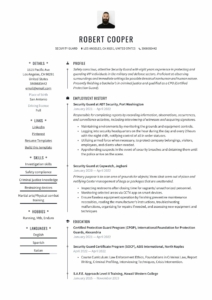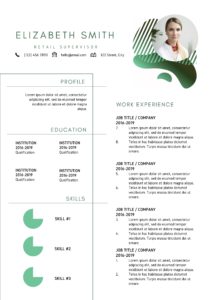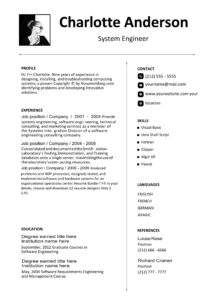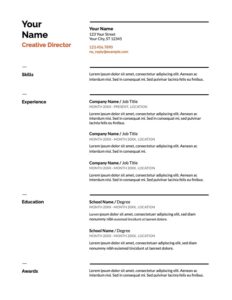Welcome to our guidelines on how to create your best Dietician resume! If you’re looking to start your new job/career, stick around and check out what we have to offer!
This is one of those rare few jobs relevant to literally everyone, and the turnover in this industry is huge, so you’ll need to have a spicy resume lined up before you start your job hunt.
Our guidelines will help you create a resume so well that it almost ensures you an interview and gives you all the critical info on what to include, how to lay it out, and examples and tips to show you what we mean. Let’s get started.
What you can read in this article
21 Dietician Resume Examples
(Free resume sample downloads are at the bottom of this page)
Dietician Resume Writing Guide
Resume Sections
- Contact information
- Profile Summary
- Work History
- Achievements
- Education
- Skill Section
- Certification & Licensing
- Extras: Languages/Awards/Publications/Volunteering/hobbies
- > Professional information
1. Contact information
- First Name and Last Name
- Physical Address
- Telephone number
- LinkedIn Profile
What to Highlight in a Dietician Resume
Dieticians manage the nutritional well-being of patients and clients by running nutrition assessments to identify any areas clients/ patients can improve on and creating diet plans to assist them. You should already be a registered dietician with incredible people skills, solid tech skills, and counseling skills.
In this industry, you typically need a bachelor’s degree in dietetics, nutrition, or any related field.
Use a straightforward template for your resume
We can’t stress how important it is to keep your layout and fonts as simple as possible. Recruiters may frown upon fancy fonts and intricate designs, leading them to ignore important info, so make sure it’s easy to read, focuses on the important info, being skills and credentials.
Optimize your resume for ATS
Many companies today use applicant tracking systems (ATS) to scan incoming resumes. They evaluate candidates depending on whether they have the correct keywords. To make it past the ATS, check out the job advert and choose essential words and phrases that explain the job’s requirements.
Include these skills and experience using the same keywords the job ad uses.
List relevant activities in your resume
Back up your proficiency and experience by giving details of your training/ extracurricular activities relevant to the job. This includes memberships to professional associations or volunteer work showing off your soft or hard skills, like giving dietary guidance pro bono for underprivileged people.
Avoid using empty adjectives
It’s all good and well saying you’re “outstanding” at something, but that doesn’t explain just how outstanding you are. Highlight the facts and feature particular abilities and achievements rather than using shiny words with no real meaning. For instance, saying you’re
“A dietician with 8+ years experience in organizing, planning, and implementing healthy meals in outpatient environments” sounds better than “High-achieving dietician with experience working with varied populations.”
Go light with jargon and acronyms
Putting jargon and industry acronyms in your resume is a good idea, but don’t assume every recruiter will know enough about your job to understand all the terms. Spell the acronyms out, so all recruiters know what they are reading.
Dietician Resume Summary & Objective
A resume summary/ objective is a fantastic way to grab the attention of recruiters. A short paragraph of 4–6 sentences long highlights your best, most applicable skills, experiences, an accomplishment or two, and your top qualification.
It is essential to read the job advert to see which keywords you must use to get your resume through the ATS. If your resume summary/ objective statement doesn’t match the words used in the job description, it will discard your resume before the recruiter even gets the chance to see it.
A kick-ass summary/ objective can be written up the same way you create a meal plan: in steps. Utilize the following suggestions to give yourself the best chance of writing a summary/ objective that will blow minds and make the recruiter want to read your resume further!
- Provide your years of working experience.
- Tempt them with skills, accomplishments, and goals you want to achieve in their company.
- Provide quantitative proof of your proficiency.
The above steps were for creating a summary. You should only write a summary if you have more than three years of professional working experience.
If you’re a fresh graduate looking for your first job or an entry-level dietician, rather write an objective. Highlight your skills, qualifications, and how you plan to add value to the company.
*Pro Tip: Quantify! Use numbers to prove yourself. “Planned 40+ intricate patients’ dietary needs” sounds heaps better than “prepared meal plans.”
Examples of Summaries & Objectives
Dietician Summary 1
“Detail-oriented Dietitian with 12 years experience with proven success evaluating patients’ health requirements and preparing effective correlating plans. Knowledgeable in creating meal plans considering both costs and client preferences. Brilliant at motivating others and working collaboratively to attain the common goals of the company.“
Dietician Summary 2
“Progressive Dietitian with 11+ years experience in encouraging better nutrition by evaluating clients’ requirements and giving them advice and help in eating balanced meals. Highly proficient in assessing the efficiency of meal plans and amending them to meet clients’ dynamic dietary needs.“
Dietician Summary 3
“Progressive-minded and detail-oriented Dietitian, adept at staying up to date with the latest nutritional science research. Remarkably well-versed in creating varied, tailored meal plans to assist in meeting the nutritional requirements of every patient. Track record of evaluating, planning, and applying therapeutic services in a multidisciplinary environment. Seeking role at company X.“
Dietician Summary 4
“Inspired and adaptable Dietitian with 5+ years professional experience in attending to clients’ dietary matters by helping them to develop meal plans. Highly proficient in recording clinical productivity by evaluating the effects of applied diets and changing them as necessary. A critical thinker with a solid work ethic as an integral part of a multidisciplinary team.“
Dietician Employment History
If this is your first time looking for a job or you don’t have much professional work experience, think about using the functional format. It highlights your professional skillset, qualifications and takes focus away from your lack of experience.
If you have a decent amount of work experience, you can use the combination format. It showcases your applicable job skills and work achievements.
If you’ve been in the game for a long time, the reverse-chronological format is the one for you. It highlights your work history and accomplishments in your career.
“What if I have no experience?”
Still utilize the functional format. Elaborate on your skill set, education, and activities that showcase you’ve developed relevant qualifications. Recruiters will still consider you seriously if you can prove you’re well-studied and have the skills and personality for the job.
Writing up this section is a lot like prepping a meal plan! Pop your important info down in bullet points for simple reading. Instead of writing “Client’s Meal Plan,” put “Work Experience.”
See the instruction below as the macronutrients for your job description section:
- With every role you’ve had, supplement it with your job’s title, company's full name, and how long you worked there.
- Include some relevant quantification. They highlight your hard work.
- Don’t you ever make the mistake of copy and pasting this section every time you apply for a job. You must mold it to every new application. If they are looking for a “nutritional expert,” call yourself that. If the advert says “dietary consultant,” that’s what you are!
- Use action words like collaborated, improved, directed, etc. Recruiters love a go-getter.
Dietician at Thousand Oaks, NY
(September 2018- 2023)
Provided dietary aid to resident families, residents, friends, and staff concerning diet constraints and assisted in the Dietary department's preparation, development, and directing.
- Directed company’s program for health outreach to decrease obesity in young children and elderly, growing quarterly company income by 8%.
- Followed clients’ progress, with 80% of clients achieving their health-related goals within seven months.
- Gave biannual promotional guest lectures at California State University.
- Ran a practice with a turnover of 25+ clients a day.
Nutrition Assistant at Golden Years Retirement Home, Santa Barbara, CA
(Sep 2013- June 2018)
Assisted and developed dietary protocols for nutrition and food services to be followed by the department.
- Collected information concerning clients’ dietary constraints and nutritional requirements.
- Dispensed daily meals to more than 80 residents.
- Taught residents about suitable and realistic dietary habits.
Dietician Job Descriptions
Irrespective of your work setting and experience, there are some skills a recruiter will expect to see in your resume. Below is a list of generic dietician skills you may pick through and use if you choose to do so. You may also alter them to suit your situation/ requirements.
Examples
A Dietician’s job may include:
- Working with members to create action plans for recognized areas of improvement/ compliance.
- Developing, implementing, and changing nutrition-related procedures and policies.
- Collaborating with a team to develop content for social media support, health fairs, patient education materials, etc.
- Collaborating with the team in developing and revising medical and surgical weight loss guidelines, procedures, and educational materials.
- Creating and revising education materials that relate to disease management via medical nutrition therapy.
- Completing quarterly performance improvement reports.
- Participating in committees, meetings, and continuing education to improve individual organizational and departmental performance.
- Assisting and developing diet practices for food and nutrition services of departments to follow.
- Participating in performance improvement projects and processes.
- Providing information on nutritional support and educating patients and healthcare providers.
- Working meticulously with the Speech Therapy Department in assisting with the development of textured amended diets to guarantee patient safety and enhance oral intake.
- Assisting in the organization, development, and leadership of the Dietary department.
- Developing nutritional care plans for patients in rehabilitation settings.
- Assessing patients for nutritional status.
- Assisting with orientation and servicing new employees to the department.
- Monitoring efficiency and tolerance of nutritional regimen and recommending therapy adjustments where necessary.
- Developing nutritional care plans centered around the cultural orientation of the patient.
Accomplishments
Ladies and gents, this is not the same as the daily duties you perform. Please don’t just copy and paste those duties in this section and think you’ve got it. You rather need to think of the achievements you’ve accomplished in previous roles from doing those daily tasks well! What have you done for your company/ practice/ hospital that made things better and had you feeling super proud of yourself?
Once you have a list of them, choose the best 3 or 4, put them down in point form, and for the love of all things sacred, QUANTIFY your accomplishments!
Telling the recruiter what you achieved is ok, but anyone can just claim they did something! You need to provide proof in the form of quantification. This not only gives the reader something compelling to read, but it also gives the recruiter a way to measure your accomplishments objectively to evaluate your competence.
*Pro tip: utilize action words to help sell yourself when stating your achievements in this section. Don’t use boring, non-jargon-type adjectives.
Unquantified Accomplishment Statements:
- Effectively initiated a modified program for clients.
- Adjusted menus according to the season with menu additions that comply with state and federal guidelines for nutritional therapy.
- Performed quality guarantees on Food Service and nutrition programs.
- Developed, composed, and implemented a department procedure manual that resulted in remarkable department performance.
Quantified Accomplishment Statements:
- Effectively initiated a modified program for clients, causing a 99% retention rate for clients.
- Created and implemented 11 house therapeutic diets and adjusted seven menus according to the season with menu additions that comply with state and federal guidelines for nutritional therapy.
- Performed quality guarantees on foodservice and nutrition programs while overseeing 32 foodservice and five professional staff members,
- Developed, composed, and implemented a department procedure manual that resulted in remarkable department performance with six years deficiency-free annual Department of Health Review.
Education
This is a crucial section that often doesn’t quite hit the mark for many applicants. To prevent your resume from landing in the trash, here are our tips:
If you already have heaps of work experience, only give your post-school credentials. Provide your study dates, full degree name, where you studied, and where the institution is located.
Suppose you’re new to the industry or writing an entry-level resume, beef up your education section with relevant academic accomplishments, extracurricular activities, etc. Every little bit helps! If you worked in the college cafeteria for a while, then add it in!
Some examples:
2016- 2019 Bachelor’s degree in Food and Nutrition. University of New York, NY.
2015- Certified Trusted Nutritionist of the Academy of Nutrition and Dietetics, Online.
2014- Registered Dietitian Nutritionist (RDN) Commission on Dietetic Registration, Seattle
2014 – Council for Education in Nutrition and Dietetics (ACEND), Dietetic Internship (DI), Jacksonville
2013 – Board for Certification of Nutrition, Specialists Certified Nutrition Specialist (CNS), Onine
2012- 2014 Clinical Dietician, Academy of Nutrition and Dietetics, Online.
2010 – 2011 Registered Dietitian Nutritionist (RDN) exam, Commission on Dietetic Registration, Los Angeles
2009- Licensed Dietitian Nutritionist (LDN) – Board of Dietetics/Nutrition, Miami
2005- Registered Dietitian (RD) – Commission on Dietetic Registration, Florence
Dietician Resume Skills
Possible employers can have different things they want from you, but this industry’s skillset (technical and soft skills) is standard due to the high regard for safety.
Your skills section should not only focus on your technical skills. These are important to show you can do the job, but recruiters also want to see your soft skills (interpersonal skills) as you’ll be working with people every day.
When laying out this section, don’t use bullet points. That’s boring. Rather use a skills matrix as shown below. It’s easy to read and looks professional. Only list the most relevant skills, though, as your resume should only be 1-2 pages long, so be clever with your space.
| Technical Skills | Soft Skills |
| Planning and implementing dietary plans | Communication and interpersonal skills |
| Analyzing and recording data | Problem-solving skills |
| Knowledge of nutritional values | Critical thinking |
| Proficiency with job-specific computer software and apps | Teamwork skills |
| Foodservice | Emotional intelligence |
| Food preparation | Customer service skills |
| Meal planning | Time management |
| Stocking and ordering | Organizational skills |
| Assessing nutritional needs | Active listening |
| Knowledge of medical software | Monitoring |
*Pro-Tip: It never hurts to read through the job requirement to see if the employer is looking for specific skills. If they are, include those skills word-for-word if they apply to you. Don’t just spew out random skills and hope the recruiter will like some of them.
Qualifications/Certifications associated with Dieticians
| Certified Nutritional Consultant | Certified Clinical Nutritionist | Certified Nutrition Research Scientist |
| Certificate in Dietetics | Board Certification in Holistic Nutrition | Certified Specialist in Gerontological Nutrition |
Extra Sections for your Dietician Resume
Show the recruiters who you are as a person. These extra sections may just be the difference between you and the other shortlisted applicants! You can add things like:
- Special projects
- Certificates on resume
- Foreign languages
- Achievements
- Volunteering
- Hobbies/ personal interests
*Pro Tip: Should you list references on your resume? No, it’s a waste of space. Recruiters know they can expect them, anyway.
Professional Information on Dieticians
Sectors: Sports. Medical, Healthcare, Fitness, Exercise Sciences, Recreation, Gym, Leisure, Training,
Career Type: Healthcare, Medical, Wellness,Training, Teaching, Supervisory, Instructing, Servicing,
Person type: Supervisor, Teacher, Analyst, Coach, Advisor, Facilitator, Consultant
Education levels: Bachelor Degrees and Upwards, Accreditations, Certifications, License
Salary indication: $64 047 per annum (Salary.com)
Labor market: Growth of 8% between 2019 – 2029 (BLS)
Organizations: Hospitals, Schools, Retirement Homes, Military, Private Practice, Public Practice, Medical Facilities, Healthcare Companies, Food Manufacturers
Download Dietician Resume Examples
